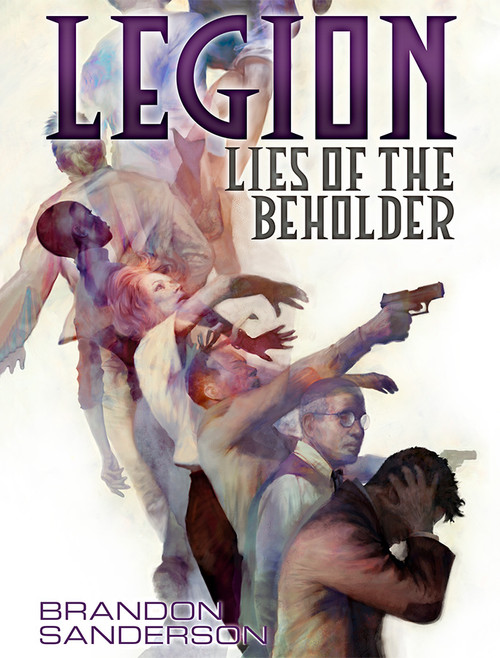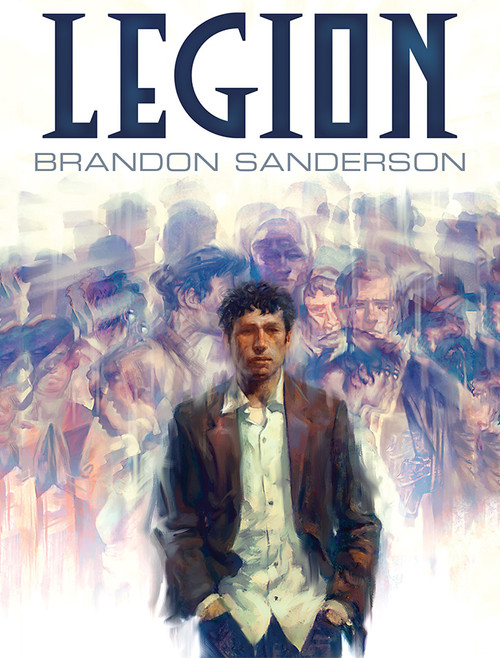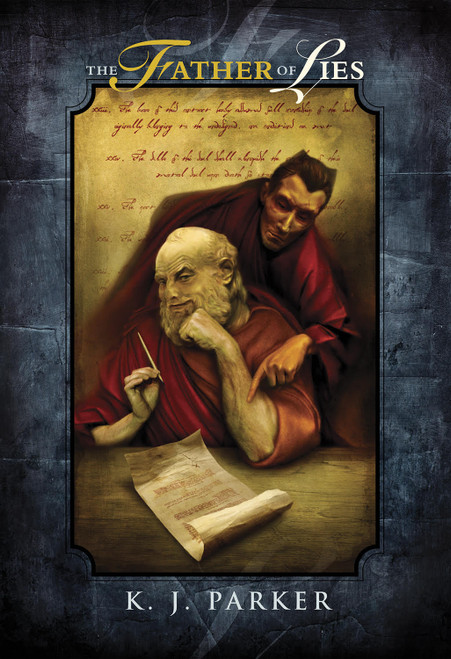Dust jacket and interior illustrations by Jon Foster.
About the Book:
Brandon Sanderson is one of the most significant fantasists to enter the field in a good many years. His ambitious, multi-volume epics (Mistborn, The Stormlight Archive) and Hugo Award-winning The Emperor’s Soul have earned both critical acclaim and a substantial popular following. In the Legion series, distinctly contemporary novellas filled with suspense, humor, and an endless flow of invention, Sanderson has revealed a startling new facet of his singular narrative talent.
Stephen Leeds, AKA “Legion,” is the series’ hero, a man whose unique mental condition allows him to generate a multitude of personae: hallucinatory entities with a wide variety of personal characteristics and a vast array of highly specialized skills. The third and final entry in the series, Lies of the Beholder, is perhaps the strangest, most unpredictable installment to date.
The story begins with two seemingly unrelated events: the disappearance of Armando, one of Stephen’s many “aspects,” and an unexpected cry for help from Sandra, the woman who, many years before, helped him learn to live with his condition. These events lead Stephen, along with several of his aspects, to a sinister high-tech firm specializing in advanced methods of human incarceration. The result is a visionary meditation on the mysteries of the human personality. Like the volumes that preceded it, Sanderson’s latest is original, challenging, and utterly absorbing. In Stephen Leeds, a man constantly struggling to understand and control his own divided nature, he has created one of the most compelling heroes in recent popular fiction. Like the best of Sanderson’s work, Lies of the Beholder is something special. It is the clear product of a master storyteller, and it is not to be missed.
Legion: Lies of the Beholder will feature a full-color dust jacket, and two full-page, full-color interior illustrations by Jon Foster.
Limited: 2500 signed numbered hardcover copies
Lettered: 26 signed leatherbound copies, housed in a custom traycase
An interview with Brandon Sanderson
Conducted by Gwenda Bond
Before we jump in on the third installment, can you tell me a little about where this idea came from and how it developed into this novella series?
I was talking with my friend Dan Wells, who was writing a story about a schizophrenic. I started brainstorming this idea about a person whose hallucinations helped them, kind of turning it into a super power. Dan laughed and said, “That’s much more a Brandon story than a Dan story,” and he was right—so eventually, I decided to write it myself.
Lies of the Beholder finds Stephen Leeds in a more precarious place—psychologically and otherwise—than we’ve ever seen him. What are the challenges of writing a character like this with so many aspects? Was this a difficult story to write?
This was a very difficult story to write, but not because of all the aspects. They’ve always made the story easier, not harder. Being able to take an individual’s personality and split it into various themes and ideas...well, that was fun, and helped me understand him a great deal.
The challenge of this story was finding myself wanting to explore the more philosophical and conceptual side of what it means to be Stephen Leeds—and why I related to him specifically as a character. I had to decide if I wanted this ending to be like the other two novellas—pretty straightforward detective mysteries—or if I’d let myself go off into something more conceptual.
In the end, I went more conceptual, which I felt was appropriate to ending this series. However, it does mean this story was a challenge in that I was dealing with some heady themes while trying to do justice to the actual mystery. I’m not 100% sure if those two ever ended up balancing right, but I do think this was the correct way to go with the ending.
I’m curious how you develop Leeds’ aspects. Do they come to you fully formed? Did you get attached to any of the aspects in particular as you write them? Do you have a favorite?
Generally, I don’t play favorites with characters. If they all haven’t been my favorite at some point in the writing process, then I’m doing something wrong. But creating characters, at the same time, is the most difficult part of the process for me to quantify. No character comes fully formed; it’s always a struggle to find their voice. Yet I always know that voice is out there to find, and have an instinct for when it’s wrong. So the process of finding it is more a search than it is a building project.
The mysterious Sandra plays a big part in this final story—did you know from the beginning what her role would turn out to be or was this ending a surprise to you? (Without spoiling anything, of course!)
With my shorter works like this, I tend to let the story evolve over time more than I do with longer stories. This means more discovery, as I’m not sitting down with a framework—the goal, often, is to practice other skills in my writing. (Things that my novel writing doesn’t teach me.) In this case, I had ideas for Sandra, and some of those ended up going all the way through—but some I discarded over time. I’m not one who is “surprised” by my writing, however. I don’t generally like that phrasing. Sometimes as you’re working on a piece, you discover a thread or theme that intrigues you—so you dig into it further, then develop it. Sometimes this means the final piece of art doesn’t match the outline. It’s not really a surprise so much as a common side effect of the writing process.
You’ve talked a bit elsewhere about how this is some of the most personal storytelling you’ve done. What do you think you’ve discovered or uncovered through exploring mental health and the mind through the story of Stephen Leeds?
I am often quite certain I know (in general) what a reader’s reaction will be when I release a story. That’s part of my job—to create something that produces an emotional response. Art is the act of inspiring emotion. Once in a while, however, I do something for the emotion it inspires in me, with less regard for how I think it will be received. Of course, usually these two are one and the same—the emotion it gives me will be the emotion most readers will feel.
This story is different. It is partially about mental health, yes, but it’s also about the voice of a storyteller finding balance between all the voices crying for his attention. It’s about the unwritten stories.
You see, as a young writer, I never worried if I’d have time to get to all the stories I wanted to tell. I was far more focused on whether or not I’d even have a career. I wrote assuming that if a story didn’t work now, I’d eventually find a place for it. But as I’ve grown older, the realities of aging have begun to whisper to me that I need to stay focused—that if I want to complete my life’s work, some other stories will simply have to be abandoned. That has been a hard realization. I don’t know if anyone else will see that meaning in this story, or how this even relates—but it is certainly part of Lies of the Beholder for me. That’s the part I say is very personal, but which means it’s more difficult to gauge how readers will respond—because so much of this is a very individual story.
Is it really the end? Could you ever potentially come back to Legion?
I’d like to do more with Legion—though it’s likely to be in the form of other media. We have a television show in the works, and I’ve toyed with doing some original audio stories with Stephen in the lead. (Though the Marvel show Legion probably means I’ll need to change the name of mine if we do get the show off the ground.)
- artists_list:
- Jon Foster
- authors_list:
- Brandon Sanderson
- binding:
- Hardcover
- book_case:
- None
- book_edition:
- Deluxe Limited
- book_type:
- Novella
- country_of_manufacturer:
- United States
- isbn:
- 978-1-59606-885-8
- is_subpress:
- Yes
- print_status:
- In Print
- year:
- 2018







